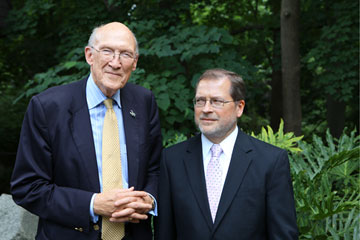
Alan Simpson and Grover Norquist, sans talking points, at the zoo.
(4 of 5)
Both men, too, are masters of cable-news shoutfests, and both claim to hate the medium. "Cable news will ruin this country," said Simpson, who then told a story about a producer speaking via his earpiece during one show, asking him to be more vicious with another guest. "I like real debates," agreed Norquist, "rather than the sense that you've got 2½, four minutes to whack the other guy on the side of the head."
Good Crises, Bad Crises
The differences between Simpson and Norquist mirror the split in the Republican Party as a whole these days, between a shrinking group of pragmatists that believes compromise is the answer and a growing faction that believes it is the enemy. For Simpson, the current state of affairs, with a dysfunctional government testing the goodwill of its creditors, is too dangerous to continue. "Every buck we spend, we borrow 40¢. We owe $17.3 trillion. It's going to $20 trillion because of the giveaway in January. And I just say that at some point in time, there's a tipping point," he told Norquist as their walk continued, referring to the New Year's tax deal that permanently extended middle-class tax cuts. "At that point, inflation will kick up and interest rates will kick up, and the guy who gets screwed is the little guy that everybody talks about all day and all night. The money guys will always take care of themselves."
But for Norquist, this very situation is nothing but another opportunity to shrink the size of government. After all, the Taxpayer Protection Pledge has been effective exactly because it brings with it the cudgel of rising interest rates and inflation if spending goes unchecked. If taxes can only go down, then each economic downturn or new expense must be met by more spending cuts or the nation's balance sheets will suffer. It's a strategy he feels has held up well since 2010, when repeated efforts by the President to raise tax revenue were rebuffed by Republicans. (Norquist doesn't count votes to allow the scheduled expiration in January of some tax cuts for the wealthy as a violation of the pledge.) "I would argue that the last three years suggest what I posited, which is, you can reduce spending without paying the other side higher taxes," Norquist told Simpson. In private he was even more blunt, confident that his no-compromise faction of the GOP was obviously triumphant. When I thanked him for agreeing to meet with Simpson at the zoo, Norquist said, "That's easier for me. I won."
But Norquist is busy doubling down now, pursuing tax cuts that would make the deficits worse, like an elimination of the estate tax, which is now assessed on inheritances greater than $5.25 million. "You mean to take it completely off?" asked Simpson, astounded. "Down to zero," said Norquist. Simpson, who knows well the comfortable lifestyle America's landed gentry enjoy, could not resist. "So poor old farmers won't go broke and rich people will be able to rat-hole more money? Is that it?"
They also disagreed on whether eliminating costly tax breaks for special interests should be treated as sacrilege. A couple of years ago, Senator Tom Coburn, a Republican from Oklahoma, introduced a bill, which Simpson supported, that would have done away with a costly and hard-to-justify tax break for corn farmers and then used the new revenue to pay down the deficit.
